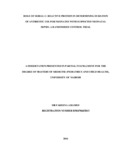| dc.contributor.author | Ahamed, Fareena | |
| dc.date.accessioned | 2017-01-05T06:36:23Z | |
| dc.date.available | 2017-01-05T06:36:23Z | |
| dc.date.issued | 2016 | |
| dc.identifier.uri | http://hdl.handle.net/11295/98995 | |
| dc.description.abstract | BACKGROUND:
Neonatal sepsis continues to be an important contributor to infant mortality and subsequently under five child mortality in Kenya. Diagnosis of neonatal sepsis can be challenging due to nonspecific signs and symptoms thus inflammatory markers such as C- reactive protein has been shown to be a useful indicator for diagnosis of neonatal sepsis.
Previous studies show that serial C reactive protein can be used to reduce the duration of antibiotic treatment for neonates with suspected neonatal sepsis. This would lead to decreased duration of hospital stay, cost benefit to the patient and prevent emergence of antibiotic resistance strains of bacteria.
OBJECTIVES:
To determine the utility of serial CRP in determining duration of antibiotic treatment for neonates with suspected neonatal sepsis in New Born Unit at Pumwani Maternity Hospital.
METHODS:
A randomized control trial was conducted and neonates were randomly assigned by block randomization. Patients in the control group were treated with antibiotics according to national health guidelines. Serial CRP was done for patients in the intervention group; antibiotics were stopped once two normal CRP levels 24 hours apart were attained. Mean duration of antibiotic treatment duration were analyzed using student t test, hospital readmission rates one week post discharge was analyzed using Fishers’ exact test.
RESULTS:
A total of 120 patients were recruited, A total of 120 patients were recruited, 66 males and 54 female patients. Sixty patients were assigned to each arm. Majority of the patients had early onset neonatal sepsis, with only 2 patients having late onset neonatal sepsis.
The mean duration of treatment in the intervention group was 6 days and 5.1 days in the control group (p=0.041). On per protocol analysis the mean duration of antibiotic treatment in intervention group was 5.9 days and 5.1 days in the control group (p = 0.08).
There were 4 readmissions within one week of discharge in the control group with none in the intervention group (p=0.119).
CONCLUSION:
There was a statistically significant difference in the duration of antibiotic therapy in both groups; however there were no readmissions in the intervention group. CRP guided treatment did not result in reduction of hospital duration for neonates with suspected neonatal sepsis.
RECOMMENDATIONS:
We recommend that a larger multi-center study is carried out to objectively study the use of CRP as an adjunct to clinical acumen in duration of antibiotic use. | en_US |
| dc.language.iso | en | en_US |
| dc.publisher | University of Nairobi | en_US |
| dc.rights | Attribution-NonCommercial-NoDerivs 3.0 United States | * |
| dc.rights.uri | http://creativecommons.org/licenses/by-nc-nd/3.0/us/ | * |
| dc.title | Role of serial c- reactive protein in determining duration of antibiotic use for neonates with suspected neonatal sepsis: a randomised control trial | en_US |
| dc.type | Thesis | en_US |
| dc.description.department | a
Department of Psychiatry, University of Nairobi, ; bDepartment of Mental Health, School of Medicine,
Moi University, Eldoret, Kenya | |


